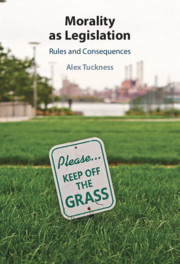Book contents
- Morality as Legislation
- Morality as Legislation
- Copyright page
- Dedication
- Contents
- Acknowledgments
- Abbreviations with Method of Citation
- Introduction
- Part I The Emergence of the Rule-Consequentialist Paradox
- Chapter 1 God and Consequences
- Chapter 2 Legislators, Architects, and Spectators
- Chapter 3 The Great Divide
- Chapter 4 Moral Expression as Legislation
- Chapter 5 Secular Heterodoxy
- Part II Contemporary Approaches to the Rule-Consequentialist Paradox
- Works Cited
- Index
Chapter 4 - Moral Expression as Legislation
Mill and Sidgwick
from Part I - The Emergence of the Rule-Consequentialist Paradox
Published online by Cambridge University Press: 29 July 2021
- Morality as Legislation
- Morality as Legislation
- Copyright page
- Dedication
- Contents
- Acknowledgments
- Abbreviations with Method of Citation
- Introduction
- Part I The Emergence of the Rule-Consequentialist Paradox
- Chapter 1 God and Consequences
- Chapter 2 Legislators, Architects, and Spectators
- Chapter 3 The Great Divide
- Chapter 4 Moral Expression as Legislation
- Chapter 5 Secular Heterodoxy
- Part II Contemporary Approaches to the Rule-Consequentialist Paradox
- Works Cited
- Index
Summary
John Stuart Mill and Henry Sidgwick grappled with the perspectival problem arising from Bentham’s full rejection of the theological justification for the legislative point of view. Mill’s intriguing suggestion that “wrong” refers to that which should be punished by law, public opinion, or private conscience combined with his assumption that all three are open to revision on utilitarian principles leads to the interesting conclusion that our moral statements about right and wrong are tacit legislative proposals. When deciding whether to voice our moral opinions we must think like legislators enacting a rule. This was in tension with the idea that our public expressions of moral judgment should be spontaneous reactions to the poor choices of others. Sidgwick grasped the implications of this issue more clearly and more self-consciously than did Mill, since it meant that there was a potentially deep disjunction between what is right according to utilitarianism and what utilitarianism tells us to publicly state as right. Sidgwick’s defense of an esoteric morality is the final outcome of the attempt to secularize morality as legislation.
- Type
- Chapter
- Information
- Morality as LegislationRules and Consequences, pp. 101 - 125Publisher: Cambridge University PressPrint publication year: 2021



